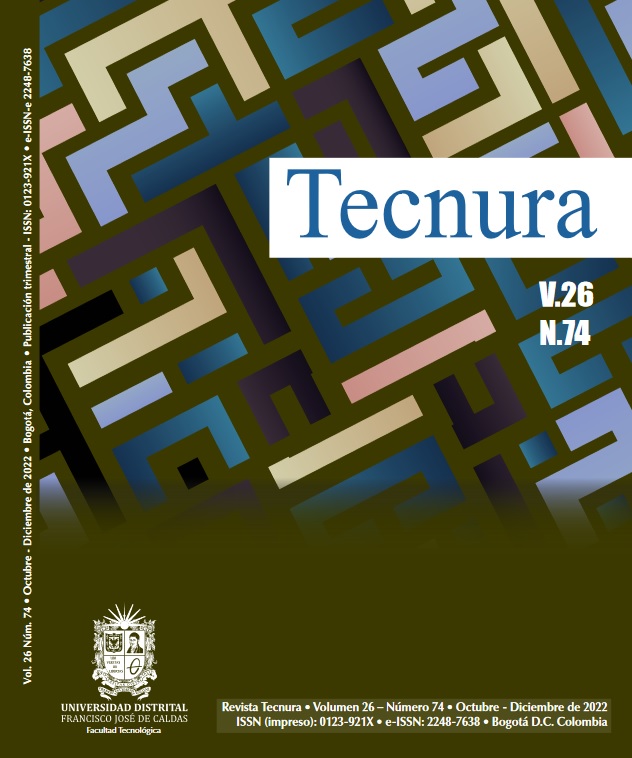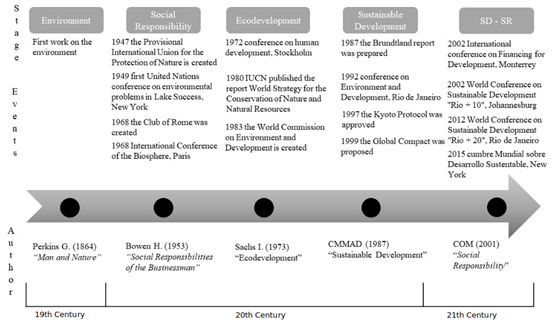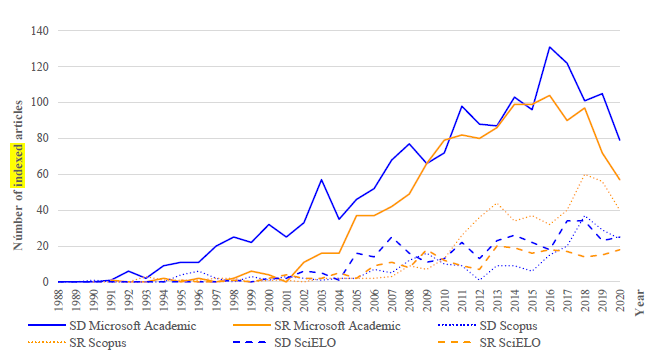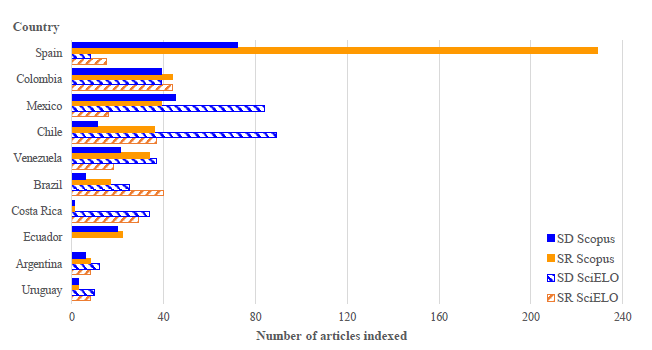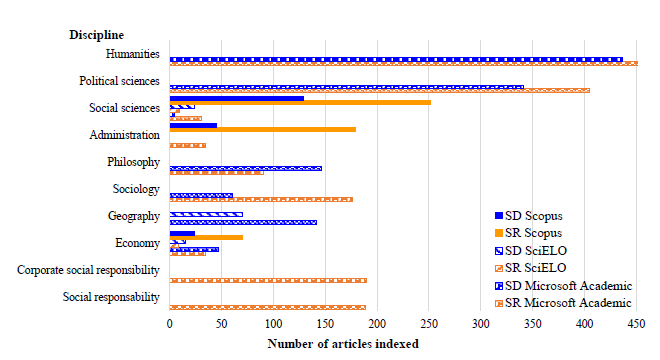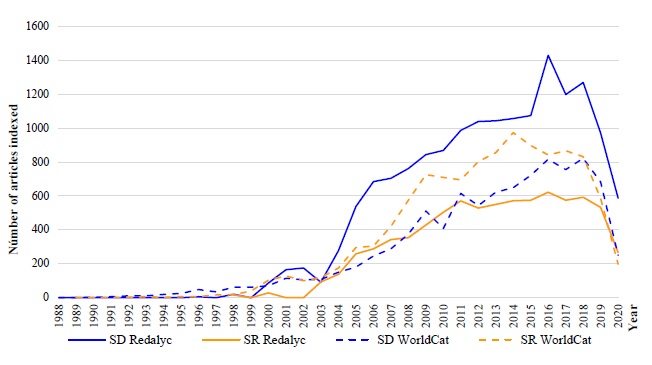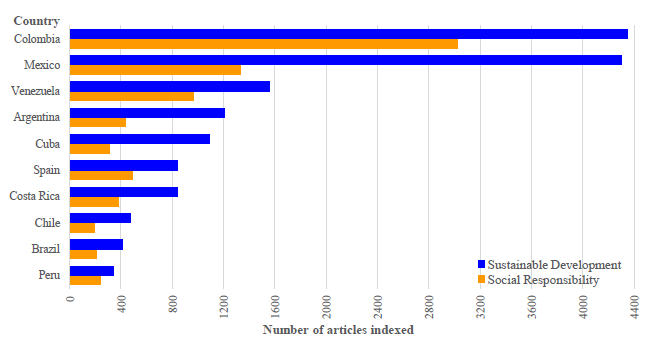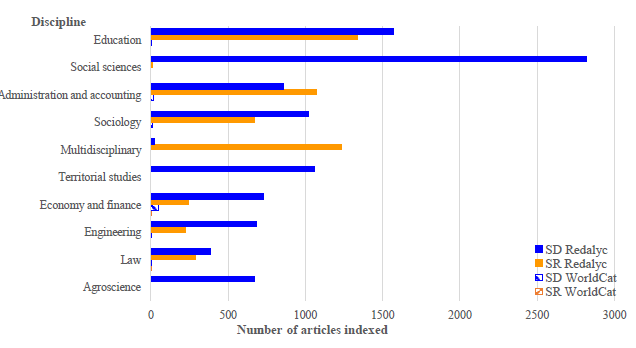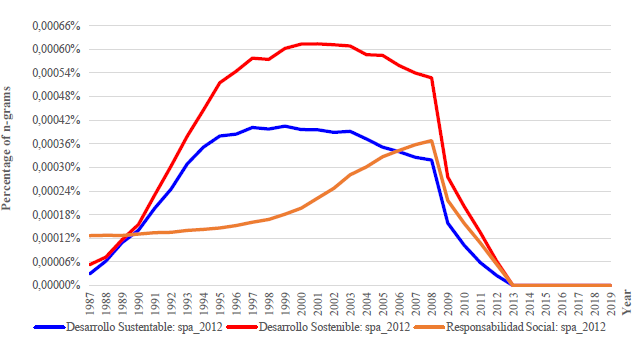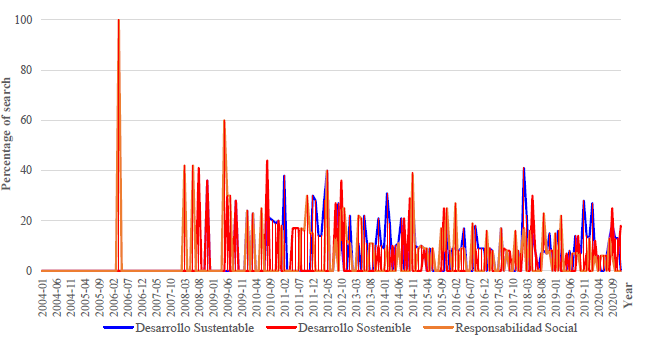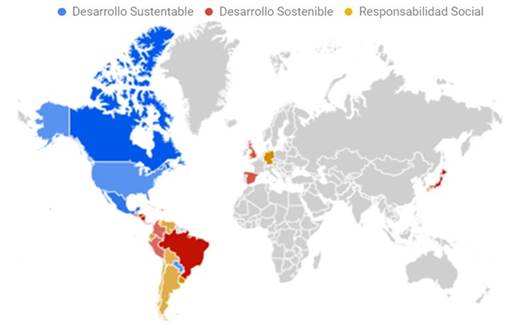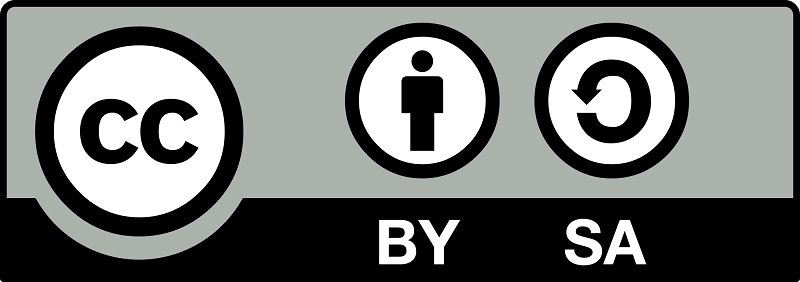DOI:
https://doi.org/10.14483/22487638.18113Publicado:
01-10-2022Número:
Vol. 26 Núm. 74 (2022): Octubre - DiciembreSección:
RevisiónThe From Sustainable Development to Social Responsibility: A perspective of Scientific Production Indicators and General Interest in Spanish
Del desarrollo sostenible a la responsabilidad social: una perspectiva de indicadores de producción científica e interés general en español
Palabras clave:
General interest, scientific production, social responsibility, sustainable development (en).Palabras clave:
Interés general, producción científica, responsabilidad social, desarrollo sostenible (es).Descargas
Referencias
Accinelli, E., & de la Fuente, J. (2013). Responsabilidad social corporativa, actividades empresariales y desarrollo sustentable: modelo matemático de las decisiones en la empresa. Contaduría y administración, 58(3), 227-248. https://doi.org/10.1016/S0186-1042(13)71228-2 DOI: https://doi.org/10.1016/S0186-1042(13)71228-2
Amato, C. (2015). Relación entre sustentabilidad, responsabilidad social y responsabilidad extendida al productor. https://sustainabledevelopment.un.org/content/documents/639491-Amato-Relacion%20entre%20Sustentabilidad%20Responsabilidad%20Social%20y%20Responsabilidad%20Extendida%20al%20Productor.pdf
Boidin, B., Postel, N., & Rousseau, S. (2009). La responsabilité sociale des entreprises: une perspective institutionnaliste. Presses Universitaires du Septentrion
Bowen, H. (1953). Border social responsabilities of the businessman. Harper.
Cabrera, R. (2016). Software para facilitar la evaluación de la arquitectura de la información en la web [Undergraduate thesis, Universidad Central “Marta Abreu” de las Villas]. https://dspace.uclv.edu.cu/bitstream/handle/123456789/8905/TESIS%20ROBERTO%20CABRERA.pdf?sequence=1&isAllowed=y
Campos, D., & Bermúdez, L. (2020). PYMES, responsabilidad social y desarrollo sostenible. InterSedes, 21(43), 131-151. https://doi.org/10.15517/isucr.v21i43.41989 DOI: https://doi.org/10.15517/isucr.v21i43.41989
Cantú, P. (2013). Responsabilidad Social Empresarial en el marco de la sustentabilidad. Economía y Sociedad, 18(44), 21-33.
Choi, H., & Varian, H. (2012). Predicting the present with Google Trends. Economic Record, 88(s1), 2-9. https://doi.org/10.1111/j.1475-4932.2012.00809.x DOI: https://doi.org/10.1111/j.1475-4932.2012.00809.x
Chirinos, M., Fernández, L., & Sánchez, G. (2012). Responsabilidad empresarial o empresas socialmente responsables. Razón y Palabra, 17(81), 2-17.
COM (2011). Libro Verde: Fomentar un marco europeo para la responsabilidad social de las empresas. Comisión Europea.
Crespo, F. (2010). Entre el concepto y la práctica: responsabilidad social empresarial. Estudios Gerenciales, 26(117), 119-130. https://doi.org/10.1016/S0123-5923(10)70137-6 DOI: https://doi.org/10.1016/S0123-5923(10)70137-6
Dehkordy, S., Carlos, R., Hall, K., & Dalton, V. (2014). Novel data sources for women's health research. Academic Radiology, 21(9), 1172-1176. https://doi.org/10.1016/j.acra.2014.05.005 DOI: https://doi.org/10.1016/j.acra.2014.05.005
Easterby, M., Thorpe, R., & Jackson, P. (2012). Management Research (4th ed). SAGE Publications.
Elkington, J. (1999). Triple bottom line revolution: reporting for the third millennium. Australian CPA, 69(11), 75-76.
Fernández, F. (2013). La dimensión económica del desarrollo sostenible. Editorial Club Universitario.
Foladori, G., & Pierre, N. (2005). ¿Sustentabilidad?: Desacuerdos sobre el desarrollo sustentable. Miguel Ángel Porrua.
García, P., Fonseca, C., & García, J. (2021). Regional Intellectual Wealth and Sustainable Development in Colombia. Tecnura, 25(68), 15-27. https://doi.org/10.14483/22487638.17389 DOI: https://doi.org/10.14483/22487638.17389
Gendron, C., & Girard, B. (2013). Repenser la responsabilité sociale de l'entreprise: l'école de Montréal. Armand Colin.
Global Compact (2007). United Nations Global Compact. https://www.unglobalcompact.org/Languages/spanish/index.html
Gómez, J., & Garduño, S. (2020). Desarrollo sustentable o desarrollo sostenible, una aclaración al debate. Tecnura, 24(64), 117-133. https://doi.org/10.14483/22487638.15102 DOI: https://doi.org/10.14483/22487638.15102
Google Books Ngram Viewer (2020a). What does the Ngram Viewer do? https://books.google.com/ngrams/info
Google Books Ngram Viewer (2020b). Graph. https://books.google.com/ngrams/graph?content=desarrollo+sustentable%3Aspa_2012%2Cdesarrollo+sostenible%3Aspa_2012%2Cresponsabilidad+social%3Aspa_2012&year_start=1987&year_end=2019&corpus=21&smoothing=3.
Google Trends (2020a). Ayuda de tendencias de búsqueda. https://support.google.com/trends/answer/6248105?hl=es&ref_topic=6248052
Google Trends (2020b). Google Trends. Comparar. https://trends.google.com.mx/trends/explore?cat=690&date=2004-01-01%202020-12-14&q=Desarrollo%20Sustentable,Desarrollo%20Sostenible,Responsabilidad%20Social.
Greenfield, P. (2013). The changing psychology of culture from 1800 through 2000. Science, 24(9), 1722-1731. https://doi.org/10.1177/0956797613479387 DOI: https://doi.org/10.1177/0956797613479387
Guédez, V. (2006). Ética y práctica de la responsabilidad social empresarial. Editorial Planeta.
Hernández, R., Fernández, C., & Baptista, M. (2010). Metodología de la investigación. McGraw-Hill.
IUCN (1980). World conservation strategy: Living resource conservation for sustainable development. United Nations. https://doi.org/10.2305/IUCN.CH.1980.9.en DOI: https://doi.org/10.2305/IUCN.CH.1980.9.en
Justel, S., Fernández, A., Victoria, M., & Lacasa, I. (2018). Twitter e información política en la prensa digital: la red social como fuente de declaraciones en la era Trump. El Profesional de la Información, 27(5), 984-992. https://doi.org/10.3145/epi.2018.sep.03 DOI: https://doi.org/10.3145/epi.2018.sep.03
Larrouyet, C. (2015). Desarrollo sustentable: origen, evolución y su implementación para el cuidado del planeta. [Undergraduate thesis, Universidad Nacional de Quilmes]. https://ridaa.unq.edu.ar/bitstream/handle/20.500.11807/154/TFI_2015_larrouyet_003.pdf?sequ
Lin, Y., Michel, J., Aiden, E., Orwant, J., Brockman, W., & Petrov, S. (2012, July). Syntactic annotations for the Google Books Ngram Corpus [Conference presentation]. 2012 Proceedings of the 50th Annual Meeting of the Association for Computational Linguistics, Jeju, Republic of Korea. https://aclanthology.org/P12-3029.pdf
Linkov, F., Bovbjerg, D., Freese, K., Ramanathan, R., & Gourash, W. (2014). Bariatric surgery interest around the world: What Google Trends can teach us. Surgery for Obesity and Related Diseases, 10(3), 533-538. https://doi.org/10.1016/j.soard.2013.10.007 DOI: https://doi.org/10.1016/j.soard.2013.10.007
Lu, Y., Wang, S., Wang, J., Zhou, G., Zhang, Q., Zhou, X., & Chou, K. (2019). An epidemic avian influenza prediction model based on Google Trends. Letters in Organic Chemistry, 16(4), 303-310. https://doi.org/10.2174/1570178615666180724103325 DOI: https://doi.org/10.2174/1570178615666180724103325
Martínez, P., & Moyano, J. (2014). Lean management, supply chain management and sustainability: A literature review. Journal of Cleaner Production, 85, 134-150. https://doi.org/10.1016/j.jclepro.2013.09.042 DOI: https://doi.org/10.1016/j.jclepro.2013.09.042
Mavragani, A., & Ochoa, G. (2019). Google Trends in infodemiology and infoveillance: methodology framework. JMIR Public Health and Surveillance, 5(2), 1-15. https://doi.org/10.2196/13439 DOI: https://doi.org/10.2196/13439
Michel, J., Shen, Y., Aiden, A., Veres, A., Gray, M., Pickett, J., & Aiden, E. (2011). Quantitative analysis of culture using millions of digitized books. Science, 331(6014), 176-182. https://doi.org/10.1126/science.1199644 DOI: https://doi.org/10.1126/science.1199644
Microsoft Academic (2020). Microsoft Academic: Search. https://academic.microsoft.com/#/search
Pérez, M. (2016). Gestión del conocimiento: orígenes y evolución. El Profesional de la Información, 25(4), 526-534. https://doi.org/10.3145/epi.2016.jul.02 DOI: https://doi.org/10.3145/epi.2016.jul.02
Perkins, G. (1864). Man and nature. University of Washington Press.
Pettit, M. (2016). Historical time in the age of big data: Cultural psychology, historical change, and the Google Books Ngram Viewer. History of Psychology, 19(2), 141-153. https://doi.org/10.1037/hop0000023 DOI: https://doi.org/10.1037/hop0000023
Postel, N., Cazal, D., Chavy, F., & Sobel R. (2011). La Responsabilité Sociale de l’Entreprise: Nouvelle régulation du capitalisme? Presses Universitaires du Septentrion.
Preis, T., Moat, H., & Stanley, H. (2013). Quantifying trading behavior in financial markets using Google Trends. Scientific Reports, 3, 1684. https://doi.org/10.1038/srep01684 DOI: https://doi.org/10.1038/srep01684
Redalyc (2020). Acerca de: Búsqueda de artículos. http://www.redalyc.org/BuscadorTextoCompleto.oa
Remacha, M. (2017). Empresa y objetivos de desarrollo sostenible. Cuadernos de la Cátedra CaixaBank de Responsabilidad Social Corporativa, 34, 1-28.
Riechmann, J., & Fernández, F. (1994). Redes que dan libertad: introducción a los nuevos movimientos sociales. Paidós.
Roitstein, F. (2004). La responsabilidad social empresarial en Argentina: tendencias y oportunidades. Revista Latinoamericana de Administración, 32, 5-14.
Sánchez, E., Pacheco, C., & Páez, C. (2020). Una visión de Ciudad sostenible desde el modelo de gestión de los residuos de construcción y demolición (Rcd) caso de estudio: Barranquilla. Tecnura, 24(63), 68-83. https://doi.org/10.14483/22487638.15359 DOI: https://doi.org/10.14483/22487638.15359
SciELO (2020). SciELO. https://scielo.org/es
Scopus (2020). Document search. https://www-scopus-com/search/
Tamames, R. (1977). Ecología y desarrollo: la polémica sobre los límites del crecimiento. Alianza.
UN (2002). Report of the International Conference on Financing for Development. https://www.cepal.org/noticias/noticias/2/10582/aconf198-11ing.pdf
UN (2018). United Nations Global Compact. https://www.unglobalcompact.org/
UN (2019). Sustainable Development Goals. http://www.fao.org/3/CA3121EN/ca3121en.pdf
UN (n.d.). Background. http://www.un.org/millenniumgoals/bkgd.shtml
Valencia, A., & Ramírez, E. (2020). ,. Revista Innovación Educativa, 20(83), 99-118.
van Marrewijk, M. (2003). Concepts and definitions of CSR and corporate sustaintability: Between agency and communion. Journal of Business Ethics, 44(2), 95-105. https://doi.org/10.1023/a:1023331212247 DOI: https://doi.org/10.1023/A:1023331212247
Velázquez, L., & Vargas, J. (2012). La sustentabilidad como modelo de desarrollo responsable y competitivo. Ingeniería de Recursos Naturales y del Ambiente, 11, 97-107.
Villegas, N., & Parapinski, A. (2013). Análisis de indicadores para determinar el grado de sostenibilidad en concretos especiales. Tecnura, 17(38), 12-25. https://doi.org/10.14483/udistrital.jour.tecnura.2013.4.a01 DOI: https://doi.org/10.14483/udistrital.jour.tecnura.2013.4.a01
Viteri, J. (2010). Responsabilidad social. Enfoque UTE, 1(1), 90-100. https://doi.org/10.29019/enfoqueute.v1n1.20 DOI: https://doi.org/10.29019/enfoqueute.v1n1.20
Volpentesta, J. (2012). Las acciones sociales en empresas con responsabilidad social. Revista Científica "Visión de Futuro", 16(2), 802-825.
WCED. (1987). Our common future. New York.
WCED. (1993). Río 92: Programa. Alianza.
Web of Science (2020). Web of Science. Search. https://www.microsoft.com/en-us/research/project/microsoft-academic-graph/ http://webofknowledge.com/Search.do
Webster, J., & Watson, R. (2002). Analyzing the past to prepare for the future: Writing a literature review. MIS Quarterly, 26(2), XIII-XXIII.
Wijaya, D., & Yeniterzi, R. (2011, October). Understanding semantic change of words over centuries [Conference presentation]. 2011 International Workshop on Detecting and Exploiting Cultural Diversity on the Social Web, Glasgow, Scotland, UK. https://doi.org/10.1145/2064448.2064475 DOI: https://doi.org/10.1145/2064448.2064475
Wolfensberger, L. (2005). Sustentabilidad y desarrollo. Suficiente siempre. Porrúa.
WorldCat (2020). WorldCat: Search. https://www.worldcat.org/search?q=&qt=lang_switch&lang=en
Cómo citar
APA
ACM
ACS
ABNT
Chicago
Harvard
IEEE
MLA
Turabian
Vancouver
Descargar cita
Recibido: 4 de enero de 2022; Aceptado: 4 de julio de 2022
ABSTRACT
Context:
In the last decades, one has the impression that the term sustainable development has evolved towards social responsibility and that the activities carried out by organizations and institutions are very similar. Nevertheless, this paper presents a theoretical discussion of the contribution of social responsibility. The question of this research is: through indicators of general interest and scientific production, it is possible to determine the evolution of sustainable development towards social responsibility?
Methodology:
Using the non-participatory method of secondary data analysis, secondary data from articles in the Redalyc, WorldCat, Microsoft Academic, Scopus, and Web of Science databases and specialized books on the topics were analyzed. Google Ngram Viewer and Google Trends were used to compare the variations of the indicators of scientific production and interest.
Results:
Through secondary data analysis, it was possible to establish indicators of general interest and scientific production. A discussion is presented on the evolution of sustainable development towards social responsibility.
Conclusions:
The results showed that the evolution of sustainable development towards social responsibility was not surpassed over time, except at some moments and in specific geographical locations.
Keywords:
General interest, scientific production, social responsibility, sustainable development.RESUMEN
Contexto:
En las últimas décadas, se tiene la impresión de que el término desarrollo sustentable ha evolucionado hacia la responsabilidad social y que las actividades que realizan las organizaciones e instituciones son muy similares. No obstante, este artículo presenta una discusión teórica sobre la contribución de la responsabilidad social. La pregunta de esta investigación es: a través de indicadores de interés general y producción científica, ¿es posible determinar la evolución del desarrollo sustentable hacia la responsabilidad social?
Metodología:
Utilizando métodos no participativos de análisis de datos secundarios, se analizaron datos secundarios de artículos en las bases de datos Redalyc, WorldCat, Microsoft Academic, Scopus, Web of Science y libros especializados en los temas. Se utilizaron Google Ngram Viewer y Google Trends para comparar las variaciones de los indicadores de interés general y producción científica.
Resultados:
A través del análisis de datos secundarios, fue posible establecer indicadores de interés general y producción científica. Se presenta una discusión sobre la evolución del desarrollo sustentable hacia la responsabilidad social.
Conclusiones:
Los resultados mostraron que la evolución del desarrollo sustentable hacia la responsabilidad social no fue superada a través del tiempo, salvo en algunos momentos y lugares geográficos específicos.
Palabras clave:
interés general, producción científica, responsabilidad social, desarrollo sostenible.INTRODUCTION
For more than two decades, an evolution of sustainable development towards social responsibility has been perceived. This has been due to the remarkable similarities in the activities carried out by organizations and institutions in favor of sustainable development and social responsibility.
Even though these actions can be of great benefit to companies, there is no shared understanding that they are a priority to contribute to sustainable development. With the declaration given by former UN Secretary-General Kofi Annan at the end of the 20th century (UN, 2018) and the establishment of the Global Compact at the beginning of the 21st, the concept of social responsibility started to evolve. It was then that experts and organizations began to discuss about their contribution to sustainable development. To analyze the change in these terms, a historical overview of the particularities that differentiate and assimilate them was carried out.
BACKGROUND
Figure 1 shows a chronology of events on the terms sustainable development and social responsibility, as well as terms that are considered to be transcendental in their evolution.
Figure 1: Sustainable development and social responsibility timeline
In 1864, Perkins, in his work Man and Nature, coined the term environment. According to Riechmann and Fernández (1994), in 1947, UNESCO founded the Provisional International Union for the Protection of Nature. In 1949, the United Nations organized the first conference to address environmental issues, which was held in Lake Success, New York. In 1953, Bowen, in his book Social Responsibilities of the Businessman, referred to social responsibility and the approach to corporate responsibility through philanthropy (Tamames, 1977). In 1968, in Paris, UNESCO held the first International Conference on the Biosphere, with the participation of more than 60 representatives from different countries. In the same year, the Club of Rome was established, which was made up of a multidisciplinary group of planners, businessmen, economists, sociologists, geneticists, and political scientists, among others (Foladori & Pierre, 2005). According to Sanchs (1981), in 1972, in Stockholm, the UN held a conference on the human environment, which established the definition of the term eco-development. The International Union for the Conservation of Nature (IUCN, 1980) released the report World Strategy for the Conservation of Nature and Natural Resources was released. In 1983, the World Commission on Environment and Development was created (WCED, 1987).
The term sustainable development was coined in Our Common Future, a report prepared for the WCED (1987). In 1992, in Rio de Janeiro, the first UN Conference on Environment and Development was held (WCED, 1993). On December 11th, 1997, the Kyoto Protocol was approved. Its main objective was for developed nations to reduce their greenhouse gas emissions by 5%. At the 1999 World Economic Forum, the former UN Secretary-General Kofi Annan once again promoted social responsibility by declaring that transnational corporations, which are the first beneficiaries of economic liberalization, must share part of the responsibility to address the social and environmental consequences derived from their activities (UN, 2018).
In 2000, the UN began to implement the Global Compact, a voluntary initiative that advocates for social responsibility. With this implementation, companies and other organizations committed to aligning their strategies and operations with the universal principles of human rights, labor standards, environment, and anti-corruption (Global-Compact, 2007). In 2001, the European Commission published the Green Paper, which promotes a framework for social responsibility (COM, 2011). In 2002, the International Conference on Financing for Development was held in Monterrey, where the importance of social responsibility was recognized (UN, 2002, as cited in Wolfernsberger, 2005). In 2002, in Johannesburg, the second World Conference on Sustainable Development Rio +10 was held. Its objective was to promote actions that would achieve sustainable development in the 21st century, and one of the topics discussed was social responsibility. In 2012, in Rio de Janeiro, the third World Conference on Sustainable Development Rio+20 (UN, n.d.) was held. On September 2015, in New York, the World Summit on Sustainable Development was held, and the 2030 Agenda for Sustainable Development was approved with 17 sustainable development goals (UN, 2019; Sánchez et al., 2020).
Definition of terms
Before all else, it is important to specify that, although some attempts have been made to differentiate between the Spanish terms desarrollo sustentable (sustainable development) and desarrollo sostenible (sustainability), both terms tend to be applied and defined similarly, as indicated in Our Common Future, based on their geographic location, their application in different disciplines, and their permanence over time (Gómez & Garduño, 2020). In Spanish translation, desarrollo sustentable (sustainable development) is used, and, in Mexico, as in other Latin American nations, desarrollo sostenible (sustainability) was adopted. Nevertheless, the same definition is used for both translations as published by the UN (Larrouyet, 2015; García et al., 2021). Therefore, this document regards them as similar, and the definition given by WCED (1987) is used, which considers that sustainable development is that which meets the needs of the present, without compromising future generations’ ability to meet their own needs.
Concerning the term social responsibility, some attempts have also been made to differentiate between responsabilidad social empresarial (companies’ social responsibility) and responsabilidad social orporative (corporate social responsibility), relying on the different legal meanings of company and corporation (Crespo, 2010). In most cases, these terms are used without distinction. As a result, in this document, such terms are considered to be synonyms of social responsibility, and the definition given by the European Commission is used (COM, 2011): social responsibility is the voluntary integration of social and environmental standpoints into everyday company operations and interactions with stakeholders, which is performed by companies given their impact on society.
The literature on sustainable development and social responsibility is vast, and there are no single, globally accepted definitions of the terms. Indistinctly, the theoretical debate is extensive and is constantly being reviewed. The turmoil of companies, organizations, and researchers is to think that any activities promoted in favor of sustainable development and social responsibility are similar. In this sense, Elkington (1999) and Villegas and Parapinski (2013) argue that a sustainable management model must consider the impact of company operations in three dimensions: economic, social, and environmental.
Research question
Considering the fundamentals, the definitions of the terms, and the evolution of sustainable development towards social responsibility, an analysis was carried out on the evolution of both terms using indicators of time, geography, and discipline.
The objective of this document is to determine whether the term sustainable development has evolved into the term social responsibility, in order to verify whether organizations and institutions contribute to the management of sustainable development.
From this perspective, the following research question was formulated:
Which indicators determine the evolution of the term sustainable development toward the term social responsibility?
To address this question, the methodology shown was based on the non-participatory method of secondary data analysis, supported by scientific databases and trend software. These non-participatory methods were then applied to analyze secondary data. In this vein, this paper presents the results obtained from the indicators, as well as a discussion and some concluding remarks.
METHODOLOGY
This research has a descriptive scope, as it is based on quantitative data obtained from non-participatory methods, such as secondary data analysis, which involves the review of physical or electronic files, public records, and documents (Hernández et al., 2010). According to Cabrera (2016), non-participatory methods are strategies that study the behavior of users without their knowledge. These methods employ usage statistics software, customer service records, analysis of search sections, and mental and people models. Based on the work by Pérez (2016), it is necessary to establish indicators for the evolution of a concept using trend software and scientific databases to show the evolutionary patterns of interest in a topic or discipline over time.
Scientific production
Scientific production on a topic is an indicator of the interest aroused by a discipline. However, it is not always so. Scientific production is affected by external factors (research areas imposed in funded calls or institutional interests) which impact the research topic and the amount produced in each period, which is known as an academic bubble (Baker et al., 2012). The annual variation in the production of scientific articles and books on a certain topic is part of the evolution of a discipline.
For Easterby et al. (2012), a literature review is a decisive step in structuring the type of research. In this sense, Webster and Watson (2002) argue that this literature review is the basis for creating and advancing knowledge, allowing the development of theory to solve problems in various areas of research and identify those that require an in-depth investigation. For Martínez and Moyano (2014), the search for scientific articles can be executed through logical operators using scientific databases, via the text in the abstract and title.
Book production
To obtain the book production indicator on a specific topic, the Google Books Ngram Viewer software was used. According to Google (2020a), this software consults the information in the Google Books database and shows the content of the books, which may range from 1500 to 2019.
In the recent literature, references were found which propose the application of computer tools to determine the interest in a topic or discipline over time. Google Books Ngram Viewer has been used by the following authors: Wijaya and Yeniterzi (2011), who carried out a quantitative analysis of culture using millions of books; Wijaya et al. (2011), who conducted studies on the use of books through the semantic changes of words over time; Lin et al. (2012), presented the new edition of Google Books Ngram Viewer, along with its features and examples of use; Greenfield (2013), who used it to evaluate the predictions made by theory on the changing psychology of culture between rural and urban populations; Pérez (2016), who used it to indicate the production of books on the subject of knowledge management; Pettit (2016), who conducted a study on the culture of psychology and its variation over time; and Younes and Reips (2018), who provided evidenced of the long-term affiliation between ecological and cultural changes in German-speaking countries, based on the theory of social change and human development.
General interest
The quantitative progress of searches carried out on the Internet can be studied as an indicator of general interest in a given topic (Pérez, 2016). Google Trends (2020a) is a search trend software that examines historical trends by location and category while using a search proportion scale of 0 to 100.
Google Trends has been used by the following authors: Choi and Varian (2012), who showed its use in forecasting short-term economic indicators; Preis et al. (2013), who quantified market performance through searches that detect early warning signs; Dehkordy et al. (2014), who used it as a source of information to monitor and investigate public health of breast cancer; Linkov et al. (2014), who showed the interest of the population in bariatric surgery, thus helping to improve medical care and services through the use of information; Pérez (2016), who presented a public interest indicator of knowledge management; Justel et al. (2018), who analyzed the news related to Donald Trump and North Korea, the Border Wall with Mexico, and climate change; Mavragani and Ochoa (2019), who presented the first methodological framework in the use of Google Trends in infodemiology and infovigilance; and Lu et al. (2019), who developed a model to predict the occurrence of the avian influenza epidemic.
RESULTS
The results of the indicators of general interest and scientific production are shown in this section. It is through scientific databases and trend software that the evolutionary patterns of interest are incorporated. To establish the evolution of sustainable development and sustainability (SD) and social responsibility (SR), the variability of the general interest and the annual scientific production of books and articles was analyzed.
Result analysis
While preparing the annual scientific production indicator, information was obtained from more than 48.000 articles from 1990 to 2020 in different databases. It was observed that 56,6% of these use the term sustainable development, and 43,4% use social responsibility.
Production of scientific articles
To determine the annual production of scientific articles, it was necessary to refer to the main databases: Web of Science (SciELO), Scopus, and Microsoft Academic, which stand out above the rest for their visibility and prestige. Since the approval of articles on SD and SR in Spanish is rare in the databases indicated above, the WorldCat and Redalyc databases were used to improve the query. A triple search was carried out for the Spanish terms desarrollo sustentable, desarrollo sostenible, and responsabilidad social between 1990 and 2020, obtaining six data series (see Figure 2).
Figure 2: Production of indexed articles between 1990 and 2020 in SciELO, Scopus, and Microsoft Academic
Out of the 4.191 articles, 69,6% are in the Microsoft Academic database, 16,5% in Scopus, and 13,9% in SciELO. The analysis was divided into three time periods: from 1988 to 1999, 3,56% were published; from 2000 to 2009, 24,1%; and from 2010 to 2020, 72,35%. Regarding the use of the terms, 54,12% of the articles use SD and 45,9% use SR.
As for analyzing the geographic indicator, Microsoft Academic was excluded, as it does not provide information by country. Figure 3 shows the geographic analysis of the SciELO and Scopus databases for SD and SR.
Figure 3: Comparison of SD and SR by country in SciELO and Scopus
Out of the 28 countries that have records in the SciELO and Scopus databases, only the first 10 countries with the highest number of articles are presented, representing 92,25% of the total records. In terms of production, Spain occupies the first place with 24,14%, followed by Colombia with 14,46%, and Mexico with 13,71%.
Regarding the analysis of the discipline indicator, Figure 4 shows the analysis of the SciELO, Scopus, and Microsoft Academic databases for the terms of SD and SR.
Figure 4: Comparison of SD and SR by discipline in SciELO, Scopus, and Microsoft Academic
Out of the 53 disciplines that have records in these databases, only the first 10 disciplines with the highest number of indexed articles are presented, representing 68,67% of the total records. In terms of production, humanities occupy the first place with 17,05%, followed by political science with 14,15% and social sciences with 8,55%.
A triple search was carried out for the Spanish terms desarrollo sustentable, desarrollo sostenible, and responsabilidad social in the WorldCat and Redalyc databases between 1990 and 2020. Figure 5 shows four data series.
Figure 5: Production of articles on SD and SR indexed between 1990 and 2020 in WorldCat and Redalyc
Out of the 44.340 articles, 53,48% are in the Redalyc database and 46,52% are in WorldCat. The analysis was divided into three time periods: from 1990 to 1999, 0,96% were published; from 2000 to 2009, 25,62%; and from 2010 to 2020, 73,41%. Regarding the use of the terms, 56,82% use SD and 43,48% use SR.
For analyzing the geographical indicator, the WorldCat database was excluded, as it does not provide information by country. Figure 6 shows the geographic analysis of the Redalyc database for the terms SD and SR.
Figure 6: Comparison of SD and SR by country in Redalyc
Out of the 20 countries that have records in the Redalyc database, only the first 10 countries with the highest number of articles are presented, representing 95,59% of the total records. In terms of production, Colombia occupies the first place with 30,63%, followed by Mexico with 23,42% and Venezuela with 10,49%.
As for analyzing the discipline indicator, Figure 7 shows the data on the WorldCat and Redalyc databases for the terms of SD and SR.
Figure 7: Comparison by discipline in Redalyc and WorldCat of SD and SR
Out of the 32 disciplines that are registered in the WorldCat and Redalyc databases, only the first 10 disciplines with the highest number of indexed articles are presented, representing 73,23% of the total records. In terms of production, education occupies the first place with 14,19%, followed by social sciences with 13,84% and administration and accounting with 9,51%.
Book production
To obtain information on the annual book production regarding the terms desarrollo sustentable, desarrollo sostenible, and responsabilidad social (see Figure 8), the Google Books Ngram Viewer software was used.
Figure 8: Terms within the Spanish linguistic corpus between 1987 and 2019
It is observed that the term desarrollo sostenible exhibits a linear growth from 1987 to 1997. In the period from 1998 to 2005, its production is maintained, and it reaches its highest level in 2001. As of 2006, there is a decrease in production, which is most visible in 2007. For the term desarrollo sustentable, a similar behavior can be observed, but with lower production percentages. This term shows a linear growth from 1987 to 1996. In the period from 1997 to 2004, it maintains its production, and it reaches its highest level in 1999. Since 2005, a decrease in production can be observed, which is most visible in 2009. The term responsabilidad social behaves differently: it shows little change from 1987 to 1996, it evolves linearly from 1997 to 2004, it maintains its production levels between 2005 and 2008, it reaches its highest level in 2008, and, as of 2009, its decrease is most visible.
General interest in the terms
To obtain information on the general interest in the terms: desarrollo sustentable, desarrollo sostenible, and responsabilidad social (see Figure 9), the Google Trends software was used. To determine the scientific and academic interest, a double filter was applied: the first in the books and literature category, and the second in the bibliographies and citations subcategory.
Figure 9: Interest over time in the Spanish terms desarrollo sustentable, desarrollo sostenible, and responsabilidad social
The graph shows the general interest for the three terms in jagged lines, indicating different trends. For the term desarrollo sustentable, the year with the highest search proportion is 2018, and it has an average search proportion of 6. As for responsabilidad social, the year with the highest search proportion is 2006, and it has an average search proportion of 6. Finally, for desarrollo sostenible, the year with the highest search ratio is 2010, and it has an average search proportion of 3.
Regarding the analysis of the geographic indicator of interest, the top 10 countries with the highest search proportion are presented (see Table 1 and Figure 10).
Source: Google Trends (2020b)
Table 1: Top 10 countries with the highest search proportion in Spanish between 2004 and 2020
Desarrollo Sustentable
Desarrollo Sostenible
Responsabilidad Social
Country - % of search
Country - % of search
Country - % of search
Mexico 100
Nicaragua 100
El Salvador 100
Guatemala 21
El Salvador 52
Ecuador 62
Ecuador 19
Colombia 47
Panama 62
Bolivia 17
Guatemala 39
Costa Rica 57
Chile 11
Honduras 35
Colombia 56
Venezuela 7
Peru 31
Peru 42
Colombia 5
Costa Rica 22
Bolivia 32
Peru 4
Ecuador 14
Guatemala 30
Argentina 4
Bolivia 12
Venezuela 30
United Kingdom 1
Mexico 9
Mexico 25
Figure 10 shows the countries where the terms are most popular. The darker shadings indicate the countries in which the terms are searched the most. Mexico, for example, has search proportion indicators of 100 for desarrollo sustentable, 9 for desarrollo sostenible, and 25 for responsabilidad social.
Figure 10: Comparative breakdown of the terms desarrollo sustentable, desarrollo sostenible, and responsabilidad social by country
DISCUSSION
The recent literature exhibits a discussion on the evolution of sustainable development towards social responsibility, referring to its use over time.
Accinelli and de la Fuente (2013) and Volpentesta (2012) point out that social responsibility has evolved to collaborate with sustainable development. In this vein, companies must work on different issues such as: governance, human rights, labor practices, environment, fair operating practices, consumer affairs, active participation, and community development. In Amato (2015), Cantú (2013), Fernández (2013), Guédez (2006), and van Marrewijk (2003), it is indicated that sustainability is the final objective of organizations, and it is shown how social responsibility is part of it by framing social responsibility as a contribution made by companies towards sustainable development. For Chirinos et al. (2012), socially responsible companies, in order to be considered sustainable, must have a committed leadership that goes beyond assistance, paternalism, and philanthropy. Roitstein (2004) and Viteri (2010) see social responsibility as an accumulation of good practices that each organization implements and plans together with stakeholders. This, with the purpose of creating a network of beneficial relationships that support competition and the long-term negotiations of the organization while contributing to the improvement of life conditions in society. For Velázquez and Vargas (2012), sustainable development coexists with social responsibility. Companies are the ones that voluntarily integrate these terms into their strategies, in compliance with laws and regulations, aiming for social development through the creation of values and committed business behaviors. In this sense, “networking represents a synergistic way to promote new relationship” (Valencia & Ramírez, 2020, p. 111).
According to Boidin et al. (2009), Gendron and Girard (2013), and Postel et al. (2011), there is a need for a public treatment of social responsibility issues through laws and public policies, as well as a need to debate towards sustainable development rather than business ethics, towards a hybrid regulation rather than towards sterile opposition between the public and private sectors. In this sense, Campos and Bermúdez (2020) establish a relationship between social responsibility actions and sustainable development. In both concepts, the common objective is the responsible development of the economic, social, and environmental spheres. Finally, Remacha (2017) indicates that sustainable development objectives are understood as a list of priorities for the international community and as a tool to encourage organizations to be more ambitious and demanding when it comes to adopting responsible behaviors.
CONCLUSIONS
Based on the information presented, a series of conclusions were reached which seek to clarify the evolution of sustainable development towards social responsibility. To this effect, it is important to consider what Velázquez and Vargas (2012) point out regarding implementation in certain disciplines, the geographic use of the terms, and their use over time. Hereunder are some potential causes behind these findings:
-
Regarding the use of the studied terms over time, it is noted that the decade of 2010 saw the greatest production of indexed articles in the consulted databases. Out of more than 48.000 indexed articles on the Web of Science (SciELO), Scopus, and Microsoft Academic databases, more than 56% utilize the term sustainable development and 43% utilize social responsibility. In the WorldCat and Redalyc databases, with more than 44.000 indexed articles, 57% use the term sustainable development, and 43% use social responsibility.
-
As for the geographic indicator of scientific production on the terms under study, it is noted that the Scopus and SciELO databases concur in the five countries with the highest production of indexed articles: Spain, Colombia, Mexico, Chile, and Venezuela. In Spain and Colombia, there is a preference for the term responsabilidad social (social responsibility). In Redalyc, the five countries with the highest production of indexed articles are Colombia, Mexico, Venezuela, Argentina, and Cuba. These countries have a greater preference for the term desarrollo sustentable (sustainable development). With regard to the geographic indicator of general interest, the Google Trends software shows that Mexico and the Central American countries are the countries with the highest search proportion.
-
The discipline indicator, as observed in Scopus, SciELO, Microsoft Academic, WorldCat, and Redalyc, shows that there is a greater preference for sustainable development. The disciplines with the highest indexation of articles are education, social sciences, administration, and sociology.
-
In the Google Ngram Viewer software, different behaviors were observed in the use of terms in the annual generation of books. Desarrollo sostenible (sustainability) stands out over desarrollo sustentable and responsabilidad social.
-
In the Google Trends software, it was observed that interest in the terms responsabilidad social and desarrollo sustentable have the same average search ratio, which is higher than that of desarrollo sostenible.
This allowed clarifying whether the term sustainable development evolved towards social responsibility. With the analysis of the indicators of scientific production and general interest, it was not possible to determine said evolution. Likewise, a preference for the term sustainable development was observed in the analysis by discipline, with a social and administrative orientation. Social responsibility evolved towards a term involving effective management, ethics, and environmental, social, and economic commitment. Finally, the term sustainable development coexists with the term social responsibility.
In future works, evolutionary patterns could be determined regarding the interest in a topic or discipline over time, as well as clarifying possible controversies about the use of certain terms. Non-participatory methods that use database analysis and computer tools such as Google Trends and Google Ngram Viewer should be considered. The foregoing will allow researchers and students to save costs and time in their research, since they are faster and allow obtaining information indirectly.
REFERENCES
Licencia
Esta licencia permite a otros remezclar, adaptar y desarrollar su trabajo incluso con fines comerciales, siempre que le den crédito y concedan licencias para sus nuevas creaciones bajo los mismos términos. Esta licencia a menudo se compara con las licencias de software libre y de código abierto “copyleft”. Todos los trabajos nuevos basados en el tuyo tendrán la misma licencia, por lo que cualquier derivado también permitirá el uso comercial. Esta es la licencia utilizada por Wikipedia y se recomienda para materiales que se beneficiarían al incorporar contenido de Wikipedia y proyectos con licencias similares.

